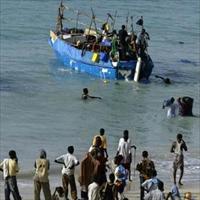MAURITANIA: More would-be migrants fleeing post coup

More Africans are risking transatlantic crossings to Europe after Mauritania’s military coup last week, according to Jerome Dukiya, a Catholic priest in the port town of Nouadhibou.
Two years ago, Nouadhibou was one of the most highly-trafficked departure points for would-be migrants trying to escape to Europe by boat.
Since the numbers attempting the crossing from Nouadhibou, as well as deaths at sea, spiked in 2006, the Spanish government and European border security agency, Frontex, have helped Mauritanian officials tighten its coastline patrol, rescuing, and turning back would-be migrants.
But Dukiya says people are still finding ways to escape, and more so now after a coup on 6 August, when army officers arrested President Sidi Ould Cheikh Abadallahi in his home. Top members of the president’s former guard have since declared power through a military council. President Abdallahi remains in detention.
“When people see that border guards are less vigilant, or simply not there, they [would-be migrants] take advantage of the more open coastline to flee.” The Catholic priest says the national military takeover has diverted attention from securing the country’s borders.
“I know when people have left to try and make it to Europe by sea because I will not see them at church for one to two weeks. Since the coup, less are coming to services.”
The head of the UN International Organization for Migration in Nouakchott, Traore Abbas, says while it is too soon to measure how many more are trying to leave illegally, the numbers will jump.
“Anytime you have changes in maritime surveillance, there will be changes in migration patterns. We expect the numbers who are repatriated [to Mauritania] to increase.”
On 13 August, more than 100 African migrants arrived on the shores of Tenerife beach in the Spanish Canary Islands, according to Spanish police, bringing the total to more than 400 arrivals, from unspecified countries, this week.
Turkish media reported earlier this week the capture of 30 migrants at sea, a number from Mauritania, earlier this week.
During the first seven months of 2008, more than 7,000 migrants reached Spain by boat, about 10 percent less than last year, and nearly 60 percent less than 2006, according to the Spanish government.
Representatives of the European Union (EU), one of Mauritania’s main partners in its efforts to control clandestine migration, have said the recent coup threatens its more than US$200 million in aid.
 Back and Next - Back and Next
Back and Next - Back and Next See Also - See Also
See Also - See Also